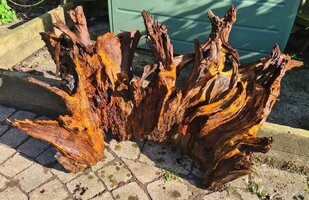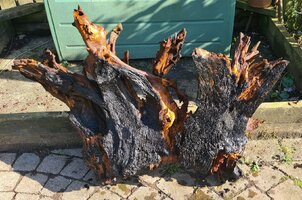I am setting up a new 30L tank and have aimed to forage the hardscape for it. I came across this large wood chunk and immediately thought I might be able to cut an interesting piece of tank wood out of it. It was very muddy and clearly dead a while.
Finally got around to jet washing all the dirt, clay and loose bits of wood away and it looks like the tree outer has been on fire or scortched at some point (Looks like charcoal)
I am sure it's the none burnt side I'll have facing out so aethetically it's not going to be a problem, just wondered other people's thoughts in regards affecting the water (in situ active charcoal, toxins, neither?).
I can leave the burnt or just cut it off. It will be going in a tank I am treating as a bit of an experiment so there is no pressure for things to go perfectly and I can bin it if there is something going on water quality wise (will be no livestock until I am happy I am going to stick with the setup longterm).
Treatment wise, I was thinking of boiling whatever chunk I decide on or giving it a week+ clean rain water soak.
Thanks.
Finally got around to jet washing all the dirt, clay and loose bits of wood away and it looks like the tree outer has been on fire or scortched at some point (Looks like charcoal)
I am sure it's the none burnt side I'll have facing out so aethetically it's not going to be a problem, just wondered other people's thoughts in regards affecting the water (in situ active charcoal, toxins, neither?).
I can leave the burnt or just cut it off. It will be going in a tank I am treating as a bit of an experiment so there is no pressure for things to go perfectly and I can bin it if there is something going on water quality wise (will be no livestock until I am happy I am going to stick with the setup longterm).
Treatment wise, I was thinking of boiling whatever chunk I decide on or giving it a week+ clean rain water soak.
Thanks.





